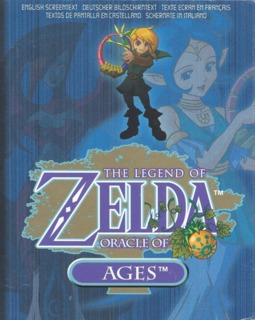A poorly-designed endgame greatly diminishes the overall fun factor in an otherwise excellent Zelda outing.
Set in an area called Labrynna, you're immediately charged with rescuing Nayru, the Oracle of Ages, from evil Gerudo witches, hoping to use her to restore Ganon (who else?) to power. Without her, time goes off-kilter, and allows evildoers to hijack the past to try to control the present. Taking a cue from Ocarina of Time, you'll have to shift between past and present, often having to open/manipulate/move something to allow you to then proceed in the present. A new element of allowing you to grow seeds that dole out prizes when they become trees also adds to the experience. The overall goal becomes to recover eight Essences of Time that will allow you to unlock the Black Tower and take on the witches to finally restore temporal balance.
As with Ocarina of Time, avoiding the temptation to completely remake the franchise is the biggest asset. By keeping things very familiar, with just a few minor additions and subtractions in gadgets, the excellent Zelda core gameplay remains in tact while still feeling fresh. The time-switching mechanic provides many of the same puzzle options as Ocarina, and they smartly expand on it by eventually allowing you to shift between eras from anywhere on the map, not just from one temple. The real kicker is when you combine the game with Oracle of Seasons. After playing either of the two games, you can port some attributes over to the other game; what's more, you'll learn secrets to take back to the first game to get additional powers in the second, so when you've finished one game, you're really not finished with it at all. It provides a nice incentive to play the games as a set, as they're meant to be played.
While avoiding the endless backtracking of Seasons by having a more wide-open environment, being able to flip to see past and present maps without actually travelling there would have been nice. You'll also encounter large animals who will transport you places you can't get until you obtain certain skills: they sort of feel tacked-on, don't serve a major purpose (some you'll use for 30 seconds and never see again) and could've been dropped in favor of simply doling out skills earlier. Sadly, they've still not added a reload feature, so if you want to start exactly as before you died, you'll need to turn on and off your machine. They also accidentally shot themselves in the foot by putting in GBA-only goodies; by adding a ring that greatly enhances your life, they negate any to desire to use any of the other 40 rings you can acquire in the game if you play on a GBA. Where things really fall apart is the finale: far too difficult, far too lengthy, and of course too little chance to save. It's a disappointing lapse in judgment having made the end too many magnitudes of difficulty beyond anything else in the game, and leaves you finishing with a taste of spinach in your mouth after eating chocolate chip cookies the first 20 hours.
Anyone playing an earlier GB or GBC Zelda game will feel right at home, as the tight gameplay remains--everything does what you need it to, when you need it to. The graphics and sound are limited due to being GBC games, but admirable work is still done on both fronts. You'll get bang for your buck, with easily 20+ hours available to hearty adventurers looking to find all the games secrets, though the horrendous end sucks a lot of the fun out. While I'd recommend playing Ages along with Seasons if at all possible for full effect, if you can only get one, bail on this and get Seasons instead.

